Crisis Management Team: Function, Roles & Responsibilities
Published on November 11, 2022
Last updated on May 26, 2025
Jump to a section
Building an Effective Crisis Management Team
Your crisis management as an organisation could either make or break your company during unexpected events, such as a natural disaster, cybersecurity attack, technological failure, and economic recession. Your preparedness using the correct crisis management strategies will ensure business continuity and prevent major financial loss.
By definition, business crises hit suddenly, when you least expect them. It's important to designate a crisis management team who will be responsible for addressing the crisis at hand and developing a solid crisis management plan to avoid a debilitating impact on your business.
Building crisis management teams should be done in advance, rather than at the onset of a crisis, to be effective. This comprehensive guide outlines what you need in order to build a crisis management team and identify the roles and responsibilities of those who will be chosen to become a part of this core team.
What is Crisis Management?
Crisis management involves preparing and executing strategies to address unexpected events, minimising their impact on your organisation. This includes developing detailed action plans, ensuring clear communication among all stakeholders, and maintaining business continuity to safeguard against financial and operational disruptions. The overall crisis response involves making crucial decisions, setting priorities, and effectively delegating tasks to ensure a strategic and calm approach during a crisis situation. Meticulously planned crisis management is crucial for rapid recovery and long term business resilience.
Effective communication of your crisis management strategies is essential, ensuring that everyone involved understands their roles during a crisis. Without such a plan, your organisation is at risk of having business operations disrupted, eating into profits and sustainability.
A crisis can happen at any time, often when you least expect it, which is why crisis management is so important.
What are the Types of Crises an Organisation Might Face?
Organisations can face many types of crisis, some of them coming with bigger threats to your business operations—such as a global pandemic. The ability to identify potential crises is critical in your risk assessment phase so you are better prepared to respond quickly and mitigate the impact of any unforeseen event.
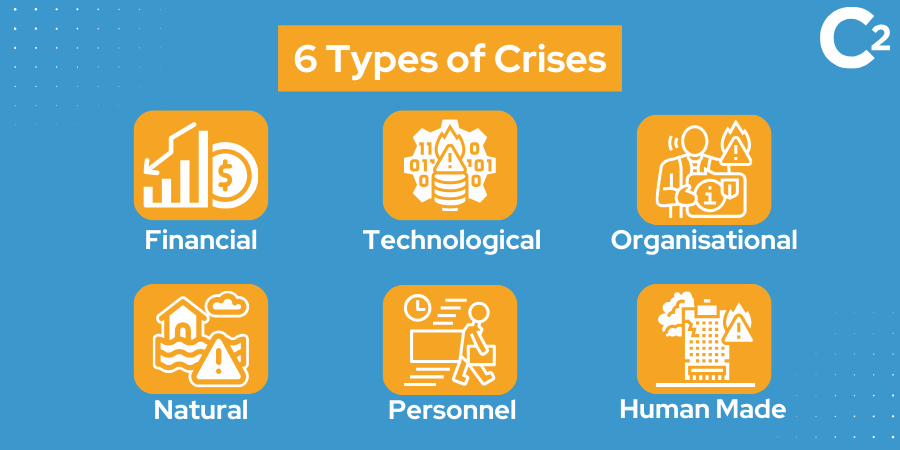
1. Financial Crisis
Financial crises are one of the most common faced by companies and can occur when a significant amount of money could be lost if the risk is not handled quickly and effectively. An example would be if the company begins to haemorrhage clients. No clients means no potential to earn revenue, damaging the company's reputation, market position, and will eventually lead to the complete collapse of the business.
Organisations that struggle financially can also lose their ability to serve customers effectively, again impacting reputation. A lack of resources puts a company at risk of losing top employees and talent, as they would look for better alternatives with more financial stability.
Senior managers need to play a crucial role in overseeing financial crisis management, making final decisions, and ensuring effective communication during such crises. Financial crises can be tough storms for all to weather, so management needs to step up and provide much-needed stability.
2. Technological Crisis
Many companies nowadays rely on technology to keep their business running, whether or not they operate in the tech field. One common example of a technological crisis is a technological failure, such as when servers aren't working, or software issues cause computers to crash. An industrial accident could be another example of this type of crisis.
Let's imagine an e-commerce store's servers crash and the website becomes inaccessible. Customers can't complete transactions or even access the site while it is down, and the company could potentially lose thousands in revenue. Backup systems can help to restore functionalities as soon as possible.
3. Organisational Crisis
Organisational crises can take many forms and they can cause great harm to organisations if left unchecked. For example, if an employee or anyone who represents a company provides misleading information about products or services, it could end up damaging organisational reputation. Companies must have an effective crisis management strategy to handle employees who take such actions to avoid hurting the company’s reputation.
Another type of organisational crisis is management misconduct, where organisational misdeeds like selling fake products, engaging in illegal activities, or selling customer information without their consent take place. This kind of crisis could be seriously detrimental to any organisation and can destroy a company's reputation beyond repair.
4. Natural Crisis
Organisations might have to face a natural disaster. Due to their geographical location, some businesses are at a higher risk for natural disasters than others. Good and strategic crisis management protocols are needed for instances such as this.
Crisis prevention is also a key component of effective crisis management strategies. An organisation's ability to withstand the impact of a natural disaster will help avoid business disruption. Early warning systems for a natural disaster are one example, and will help a company mitigate potential impact and damage to sites and personnel.
5. Personnel Crisis
Personnel crisis deals specifically with human resources. There are various forms of personnel crises that need to be accounted for in a crisis response plan.
Your employees represent your organisation. Therefore, you must choose and train your employees to maintain your brand and ensure that they act according to the priorities of your business operations. Your staff must conduct themselves properly in their private lives, as their actions could directly impact your organisation's reputation.
You must inform employees of the potential impact of their actions and behaviours, even outside the company premises. Furthermore, the key stakeholders should also have input on addressing this type of risk to the organisation's reputation.
6. Human-Made Crisis
A human-made crisis is any type of disruptive event that hurts a business due to human error or an intentional attack. For instance, a cyber attack is done with malicious intent to steal data or customer information for their own benefit.
Cyber attacks are only becoming more and more prevalent in the modern world of business and they can affect small- and medium-sized businesses more frequently and with greater impact than international conglomerates. No matter the scale of the business, management needs to be aware of the damage a human-made crisis can do.
The Importance of a Crisis Management Plan
Whether you are dealing with unexpected events or a risk that you could predict, a crisis management plan will help you reduce the potential negative impact of these events. With a crisis management strategy, you will be able to understand what steps you must take in response to a certain threat. Without a plan and effective crisis communication, you are left scrambling on what to do and how to recover.
A crisis management plan prepares you for the worst so you know what to do and when. Having legal counsel as part of your crisis management team is crucial for providing legal guidance and ensuring compliance during a crisis. Some of the reasons why choosing the best crisis management methods can prove helpful include:
- You can predict crises and identify the signs when they could happen. The more you can predict a crisis, the better you can prepare for it. It reduces the long-term impact of an unforeseen event on your business.
- It allows you to form crisis management teams and identify the roles of each member of your team. This approach allows you to maximise human resources and manpower. Everyone is aware of what you will do in certain situations.
- It ensures effective crisis communication and preserves your organisational reputation. It shows your customers, key stakeholders, and business partners that you can handle the crisis effectively and that your recovery efforts are on the way.
- Your employees are safe. During a crisis situation, time is critical. You can ensure employees’ safety by knowing how to respond to certain events.
- It ensures compliance for your organisation. Many regulatory bodies require that you have a solid crisis management plan, or you could end up paying hefty fines.
- Your business continuity is ongoing. Even in the face of natural disasters or any other unexpected events, you can maintain business operations and reduce the potential negative outcomes of the crisis.
How to Create a Crisis Management Plan
The next step is knowing how to build a solid crisis management plan. Be as thorough as possible, there is no such thing as being too prepared in the world of business continuity and operational resilience.
1. Perform risk analysis
The first step in the crisis management process is to identify the potential risks to your business. It could be a natural or technological crisis it's important to do a thorough risk assessment to identify your most vulnerable risks and the best way to respond to such crises.
2. Build crisis management teams
You must designate a team solely responsible for developing a crisis management strategy. Identify the roles and responsibilities of each team member to ensure that you have a solid crisis response plan and that those are communicated effectively.
3. Choose crisis management methods
Choose a crisis communication platform to enable your crisis management teams to inform employees and keep them updated on the situation when a crisis strikes. Internal and external communication must be streamlined and efficient to ensure the successful deployment of strategies.
4. Identify crisis triggers
You must clearly establish the triggers that would signal the start of a crisis. These triggers can help you effectively launch your crisis response plan so that you can respond promptly.
5. Build a contingency plan
Once you have your crisis management plan, it's always best to have another contingency plan a backup plan. It helps ensure that you have other strategies and plans of action to mitigate risks when your initial plan does not work out.
6. Train your employees
Your employees are your most important human resources to help implement your plans. Keep them in the loop with your crisis management strategies and organise training sessions and proper exercises, even with those who are not part of your crisis management teams.
7. Revisit and update your crisis management plan regularly
Your needs and the risks you are exposed to as an organisation constantly change. Therefore, you have to regularly revisit and adapt your plans accordingly. Make sure you stay abreast of the best practices and latest standards for ensuring business continuity and crisis management policies.
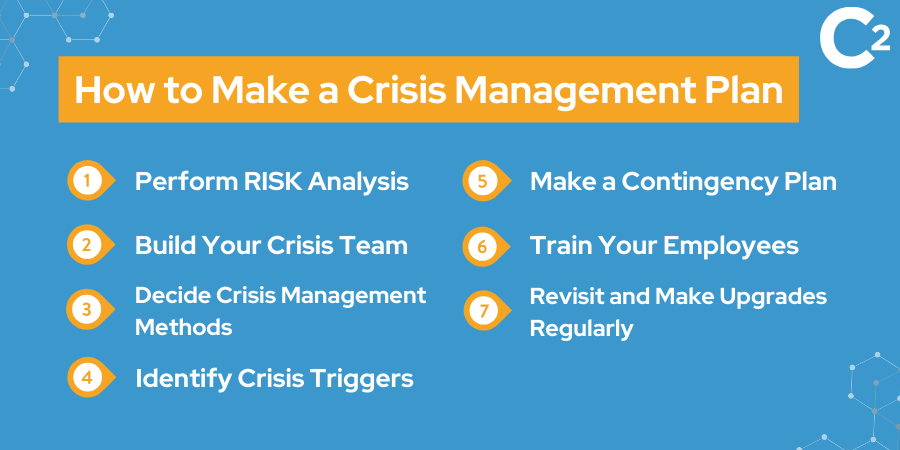
Why Do You Need a Crisis Management Team
Building crisis management teams enable your business to have a team that is solely responsible for risk assessment, and crisis management development within your organisation. It gives you an assurance that your crisis management strategies are constantly evaluated, tested, and implemented at the appropriate times to make sure that you can handle any crisis situation, big or small.
Organising such a team involves selecting appropriate representatives from various departments, ensuring the team has the right skills and leadership, and conducting training exercises to prepare for emergencies.
The main purpose of the crisis management team is to lead the entire organisation in the crisis management process. They know the detailed crisis response plan and can communicate it with the rest of your organisation so that you can organise how you respond to various types of crises, and that your responses are appropriate for the crisis levels.
It’s worth noting that your crisis management team differs from the risk management team. Each of these teams has different roles to play, which are both integral to the survival and continuity of your business operations.
Building The Right Team to Avoid Reputational Damages
You can probably imagine what could happen if an organisation didn't have the right team structure or members on board when they reach a crisis point.
Poor leadership, decision-making or teamwork skills could result in the event spiralling out of control and leading to a negative financial impact, loss of customers, reputational damage and more.
One example of this in practice could be the mass dismissals of over 800 staff from P&O Ferries in 2022. The company aimed to replace these employees with agency workers to cover unsustainable financial losses. However, they failed to do their due diligence in completing legal consultation processes with employees and trade unions before the dismissals.
Their actions resulted in criticism from the UK government and other prominent figures, with demonstrations and boycotts from the public and a call for an examination of existing contracts and legal responses. P&O's reputation was significantly damaged, resulting in long-term implications for their employees and management.
Roles and Functions of Your Crisis Management Team
The effectiveness of your crisis management teams is only as effective as properly designating the roles and responsibilities of every team member. Here is a breakdown of those different roles as part of your crisis response procedures, as it's inevitable your organisation will need the involvement of other departments such as:
- HR
- Finance
- Risk Management/Business Continuity
- Legal
- Communications
- IT
However, this list isn't definitive and in larger organisations, these departments may be broken down into more specific team structures.
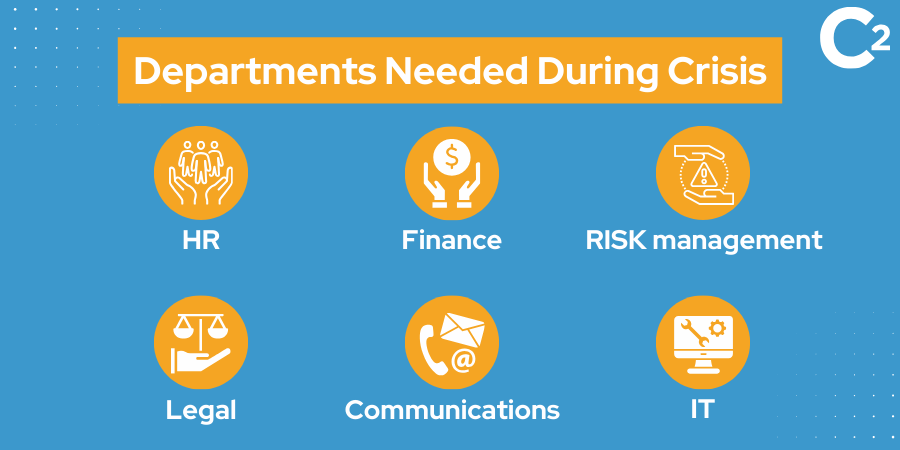
Team Structure
Another factor to take into consideration in order to build a strong and successful group that will act well in the instance of a crisis is the roles of individuals within your teams. Having and setting a clear hierarchy will guarantee your leadership has direction which can be identified, followed and practised by everyone involved.
Leadership and How to Appoint it
When appointing a Crisis Management (CM) leader and deputy, the focus should be on individuals capable of effective team management and multitasking under pressure, rather than departmental origin or seniority. Ideal candidates should demonstrate:
- Calm Temperament: Ability to remain composed during crises.
- Confidence: Decisiveness in urgent, risky situations.
- Team Collaboration: Strong cross-departmental cooperation skills.
Deputies should mirror these qualities but with added strengths in organisation, coordination, and communication to effectively relay decisions and coordinate post-crisis actions. These leadership roles are crucial for maintaining and testing business continuity processes and ensuring team preparedness and responsiveness during disruptions.

CRISIS MANAGEMENT TEAM LEADER
The crisis manager or team leader is the most important role in the crisis management team; the designated leader responsible for managing the various aspects of your crisis response actions. You must choose a crisis manager who possesses leadership skills or has held leadership roles in some capacity before this responsibility.
This is a critical role in your crisis management team, tasked with overseeing crisis response actions. It’s essential to appoint someone with experience in managing high pressure situations. A good leader can make rapid decisions, understand complex interdependencies, and commit to those decisions.
Their responsibilities include assessing risks, determining their impact on the organisation, and developing a strategic crisis response plan. Prioritising staff safety and welfare is paramount to successfully managing emergency situations. They must also set response priorities based on the potential impact on business continuity.
Beyond strategy deployment, the crisis manager must continually monitor and adapt the response plan based on its effectiveness. Recognising the need for collaboration, they should not hesitate to seek assistance from team members, stakeholders, and senior management to ensure comprehensive crisis management.
ADMINISTRATIVE SUPPORT OR SCRIBE
The administrative support staff is crucial to successful crisis management teams. They deliver support to the team members to ensure that they have the tools and capabilities to perform their job. They are also responsible for tracking developments and ensuring that any issues are resolved.
The administrative support provides practical support and knowledge to ensure that the crisis operation moves forward without any hiccups.
HUMAN RESOURCES
During times of crisis, your focus can be zeroed in on trying to ensure business continuity and disaster recovery and reassuring your customers and business partners. As a result, many organisations end up neglecting their core team of employees.
Your employees could be experiencing fear and worry when you are met with a crisis. Therefore, you must communicate with them to provide them with the added assurance that you can deliver the support they need. Make sure to provide your team member with administrative support and human resources support by enforcing their benefits, ensuring their well-being, and letting them know that business recovery is on the way.
Choose an experienced human resources manager to handle this aspect of your crisis response. When necessary, you should also help affected employees by providing medical care and support from grief counselors.
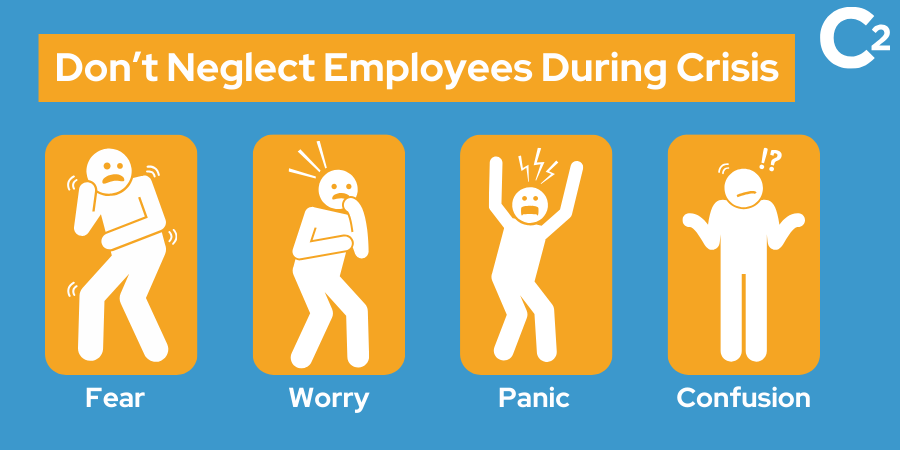
LEGAL & FINANCE
The legal and finance teams are a vital part of the crisis management team. They will be responsible for addressing issues on reporting, regulations, compliance, taxation, and accounting. The legal team provides guidance on legal implications during a crisis, ensuring that the team's actions comply with relevant laws and regulations. It is also integral to avoid any legal ramifications during times of business disruption.
On the other hand, the finance department ensures that you can maintain financial stability and have adequate resources to maintain continuity.
SECURITY & RISK ANALYSIS
The security and risk analysis team need to work together for your crisis management team to succeed. Their roles are focused on conducting risk assessments and identifying threats before they can cause adverse effects on your business operations. They must be able to identify the early signs of threat before the crisis occurs.
In fact, regular risk analysis should be integrated into every business' crisis management team role. Most organisations invest a great deal in security and risk analysis rather than deal with the significant negative impact of a business disruption.
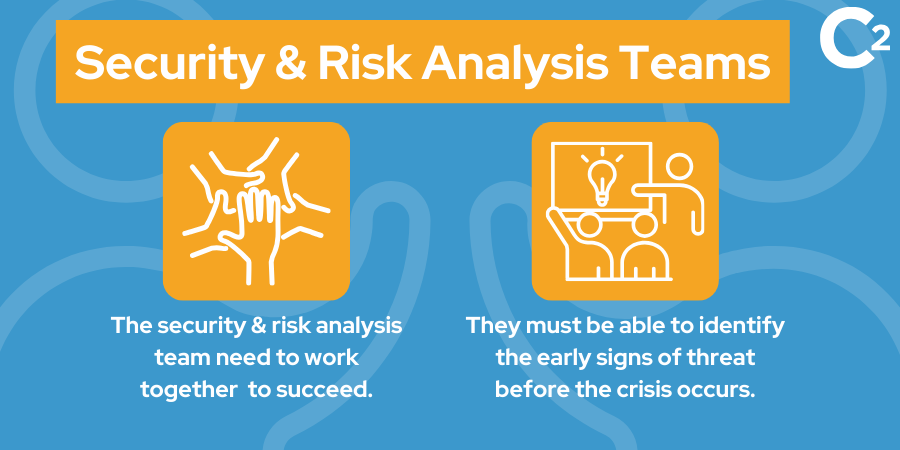
INFORMATION TECHNOLOGY (IT)
The information technology (IT) team play a vital role as part of your crisis management team. In this day and age when most businesses and organisations rely on the use of the internet and technological tools, their work is more important than ever.
The IT team provides technical support to restore, replace, and protect network servers and information systems during a crisis. The IT department can work to restore, replace, and protect your network servers and keep your information systems running again. They will also be responsible for ensuring there is no negative impact on the business as a result of the crisis.
MARKETING & COMMUNICATIONS
The marketing and communications role is vital during a time of crisis. It is important because they not only maintain internal crisis communications but also help with your corporate communications. During times of crisis, it is more important than ever to assure your business partners and customers that you have things under control.
It is the responsibility of the marketing and communications team to relay this information to your business partners, stakeholders, and customers. They must employ various crisis communications techniques and channels to ensure that the information is relayed promptly and accurately.
Characteristics of Crisis Management Team Members
The following characteristics are beneficial to a successful crisis management team. Use this list as a guide so you can put together the best team for the job.
1. KNOWS THE BUSINESS INSIDE-OUT
Every organisation faces different types of crises depending on the nature of the business. For example, a construction company faces different types of risks and threats than a restaurant business or local authorities.
For small organisations and large organisations alike, it's essential to promote a combination of big-picture thinking alongside a good understanding and due consideration of individual tasks and procedures carried out by employees across various projects and departments.
It takes a great deal of knowledge of business operations and managerial procedures to perform an effective risk assessment and business impact analysis. Therefore, you need to outline the most common risks that your business faces and come up with a damage assessment to be able to create an effective crisis management plan and to have a successful crisis management team structure.
The best crisis management teams are the ones that are specially geared to handle the specific types of risks that are present in your business. Therefore, your team is not just prepared to handle any risks, but they can face any risks that are unique to the nuances of your organisation.
2. DESIGNATES ROLES AND RESPONSIBILITIES
A good crisis management team is one that consists of individuals and team members who understands their role and responsibility. Picking a good team leader is crucial to the effectiveness of your crisis response plan. However, that is just one aspect of your crisis response team.
The best way to ensure that you can protect every aspect of your business is to identify the crisis management team roles and clearly define the responsibilities for each role. Find the right person from every relevant department required and ensure they understand the role expected of them as outlined by the crisis management plan.
3. CHOOSES TEAM MEMBERS BASED ON PERSONAL CHARACTERISTICS
Knowledge in response to a crisis is not enough. You need to find crisis management team members who also fit the characteristics and personalities that make them a good fit for their roles.
The people you want in your crisis management team are those who are confident, critical thinkers, problem-solvers, resourceful, and collaborative. They must be able to make their own decisions but also work well within a team. Even the senior management or team leaders must possess these skills, too.
4. REVIEWS DETAILS OF THE ROLE OF EACH INDIVIDUAL
It is important that you constantly review and re-evaluate the roles of each team member in your crisis response team. These roles can also change at a moment's notice, depending on the nature and severity of the crisis you are dealing with. Hence, you want to find people to become a part of your team that would be adaptable enough to deal with these changes.

Developing and Testing a Crisis Response Strategy
The first step in developing crisis management strategies would be to analyse potential risks and crises. You can do that by looking at previous crises, market research, and looking at competitors or businesses in the same industry. At this stage, the crisis management team must work closely with the risk assessment and management team.
Once you identify your organisation's vulnerabilities, the next step is to develop a crisis management strategy. You have three common types of crisis management strategies to implement.
- Proactive crisis management strategy: Planning for a potential crisis or crisis prevention. The goal is to identify potential crises to minimise their impact on your organisation.
- Responsive crisis management strategy: The response as the crisis happens and take the best action to mitigate the potential damage to the organisation.
- Recovery crisis management: The stage of the crisis response plan focused on recovery efforts. The goal is stabilising business operations to minimise disruption and improve organisational reputation.
Once you've chosen the best crisis management strategy, your next goal should be constantly testing and revising those actions. Analyse the crises. Look at how it happened and identify the ways where it could be prevented.
Then, review and revise your crisis management strategies accordingly. Communicate those plans with the key stakeholders and the rest of your team or employees. You can even conduct training and drills where necessary.
The Key Takeaways
It's never easy dealing with a crisis, regardless of the size or type of organisation. Therefore, it is important to be prepared when a crisis happens to ensure a successful recovery and overall business continuity.
Being prepared allows you to identify any potential adverse effects and pre-plan for the crisis as much as possible. An effective crisis management team can produce better outcomes.
You have to carefully evaluate the capabilities of every team member before you assign them a role in your crisis management team. Make sure that the person you choose for the position and role is capable, otherwise, they could be overwhelmed by the responsibilities they face.
It's also important to place proper consideration on communication within the crisis management team to ensure that everyone is on the same page regarding how to respond to a crisis when it does happen.
Finally, it pays to revisit your business continuity plans and strategies from time to time. It's not enough that you have the right people for the job; it's equally important that you have the right plan of action, too.
The C2 Business Continuity Management Software (BCMS) is designed to help you plan for business disruptions as well as support your crisis team at the time when an incident occurs, via its robust incident management module. Web-based tools make it easier for your crisis team to revisit and continually review your business continuity and operational resilience plans.
Written by Aimee Quinn
Resilience Manager at Continuity2
With an Honours degree in Risk Management from Glasgow Caledonian University and 6+ years in Business Risk and Resilience, Aimee looks after the design and implementation of Business Continuity Management Systems (BCMS) across all clients. From carrying out successful software deployments to achieving ISO 22301, Aimee helps make companies more resilient and their lives easier in the long run.


Written by Aimee Quinn
Resilience Manager at Continuity2
With an Honours degree in Risk Management from Glasgow Caledonian University and 6+ years in Business Risk and Resilience, Aimee looks after the design and implementation of Business Continuity Management Systems (BCMS) across all clients. From carrying out successful software deployments to achieving ISO 22301, Aimee helps make companies more resilient and their lives easier in the long run.